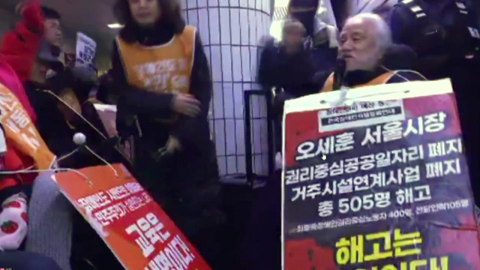-
[현장영상+] '국빈 방중' 이 대통령, 현지서 오찬 기자 간담회재생
![[현장영상+] '국빈 방중' 이 대통령, 현지서 오찬 기자 간담회](https://image.ytn.co.kr/general/jpg/2026/0107/202601071407238607_h.jpg)
- '샤오미 셀카'는 이 대통령 아이디어…만찬 메뉴 ’베이징 짜장면’ 맛은? [앵커리포트]
- 이 대통령, 오늘 임시정부 청사 방문…3박 4일 방중 마무리
- 중 권력 서열 2·3위 만나 "관계 발전 의지 재확인"
-
정청래 "썩은 사과라도 하라"…장동혁 "과거 잘못 반성"재생

- 강선우 전 사무국장 "1억 받은 적 없다" 혐의 부인…주장 엇갈려
- 민주, 국힘 쇄신안 두고 "말뿐인 사과·기만"
- 극우 유튜버 고성국, 국민의힘 입당…장동혁 '쇄신안' 초읽기 [앵커리포트]
-
코스피 4,600도 뚫어…'14만 전자·76만 닉스' 기록재생

-
코스피가 개장 직후 1.6% 이상 급등하며 사상 처음 4,600선을 넘었습니다. 새해 들어 코스피가 매 거래일마다 100포인트 이상 오르면서 새 역사를 쓰고 있습니다. 반도체 투톱의 상승세가 뜨거운데요, 삼성전자와 SK하이닉스는 오늘도 최고가를 기록했습니다. 취재기자를 연결해 좀 더 알아보겠습니다. 류환홍 기자, 코스피 상승세가 놀라운데 현재는 얼마나 올라와 있습니까? [기자] 코스피가 4,610선까지도 넘었었는데 지금은 4,570선으로 내려와 숨을 고르고 있습니다. 코스피는 0.9% 오른 4,566으로 출발했는데 6분쯤 지나서 상승폭이 1.6%로 커지며 사상 처음 4,600선을 넘었습니다. 이후 1.7%로 상승폭이 더 커져 4,611까지도 넘겼습니다. 개장 직후 개인이 순매수를 하면서 지수가 올랐는데, 그 이후 개인은 순매도로 돌아섰고 외국인이 순매수를 이어받았습니다. 오늘도 코스피 상승의 주역은 반도체 투톱이었습니다. 삼성전자는 4% 가까이 올라 144,000원대에 첫 진입을 해서 '14만 전자' 기록을 세웠습니다. SK하이닉스는 5% 가까이 오른 762,000원대에 처음 오르며 '76만 닉스' 기록을 달성했습니다. 간밤 뉴욕증시에서 다우와 S&P500 지수가 사상 최고치로 마감했고 메모리 반도체 업체인 마이크론이 10% 이상 급등한 영향으로 보입니다. 반도체 투톱이 연일 최고가를 경신하면서 증권사 중에는 '18만 전자'와 '95만 닉스'까지 목표가를 제시하는 곳이 나오고 있습니다. 미국 IT·가전 전시회, CES에서 휴머노이드 로봇을 선보여 관심을 끈 현대차가 12% 급등하는 등 현대모비스, 현대글로비스 등 현대차그룹주도 강세입니다. 코스닥은 0.2% 오른 957로 출발했지만 곧장 하락세로 접어들어 1.2%까지 하락폭이 깊어졌습니다. 개인 홀로 순매수를 하고 있지만 외국인과 기관은 순매도를 하고 있습니다. 원-달러 환율은 1,448원으로 출발해 1,450원까지 오르는 등 1,440원대 후반에서 움직이고 있습니다. 베네수엘라 사태 이후 원-달러 환율은 1,440원대 후반으로 올라온 상태입니다. 지금까지 YTN 류환홍입니다. ※ '당신의 제보가 뉴스가 됩니다' [카카오톡] YTN 검색해 채널 추가 [전화] 02-398-8585 [메일] social@ytn.co.kr
실시간 이슈
에디터 추천뉴스
-
재생
 뜨거운 CES 2026…'깐부' 정의선·젠슨 황 만났다
뜨거운 CES 2026…'깐부' 정의선·젠슨 황 만났다 -
재생
![[날씨] 내일부터 다시 강추위, 서울 -9℃…중부·경북 한파주의보](https://image.ytn.co.kr/general/jpg/2026/0107/202601071230278029_h.jpg) [날씨] 내일부터 다시 강추위, 서울 -9℃…중부·경북 한파주의보
[날씨] 내일부터 다시 강추위, 서울 -9℃…중부·경북 한파주의보 -
 애경산업, 보존제 성분 혼입 중국산 치약 6종 자발적 회수
애경산업, 보존제 성분 혼입 중국산 치약 6종 자발적 회수 -
재생
![반도체가 끌어올린 4600선…대형주 쏠림 커져 [앵커리포트]](https://image.ytn.co.kr/general/jpg/2026/0107/202601071237209036_h.jpg) 반도체가 끌어올린 4600선…대형주 쏠림 커져 [앵커리포트]
반도체가 끌어올린 4600선…대형주 쏠림 커져 [앵커리포트] -
 "다윗왕도 여자 많았다"며 여신도들 성착취…50대 전직 목사 구속
"다윗왕도 여자 많았다"며 여신도들 성착취…50대 전직 목사 구속 -
 "초코바 15개 샀더니 상자 15개"…쿠팡 또 과대포장 논란
"초코바 15개 샀더니 상자 15개"…쿠팡 또 과대포장 논란 -
 카카오에서 성추행한 개발자, 토스 이직 3일만에 퇴사 조치
카카오에서 성추행한 개발자, 토스 이직 3일만에 퇴사 조치 -
 전장연 "지방 선거까지 지하철 탑승 시위 유보"
전장연 "지방 선거까지 지하철 탑승 시위 유보" -
 소련에 미국 비밀 팔아넘긴 CIA 요원, 감옥에서 생 마감
소련에 미국 비밀 팔아넘긴 CIA 요원, 감옥에서 생 마감 -
재생
 백악관 "그린란드 인수, 미군 투입도 검토"…국무부는 부인
백악관 "그린란드 인수, 미군 투입도 검토"…국무부는 부인 -
 '라멘' 아닌 '라면'…옥스퍼드사전에 한국 단어 8개 추가
'라멘' 아닌 '라면'…옥스퍼드사전에 한국 단어 8개 추가 -
 "상호관세 패소하면 트럼프 행정부 200조 돌려줘야"
"상호관세 패소하면 트럼프 행정부 200조 돌려줘야"
많이 본 뉴스
- 1 정청래 "썩은 사과라도 하라"...장동혁 "과거 잘못 반성"
- 2 카카오에서 성추행한 개발자, 토스 이직 3일만에 퇴사 조치
- 3 "상호관세 패소하면 트럼프 행정부 200조 돌려줘야"
- 4 "고양이 키우면 이사해라"...인천 오피스텔 공지 논란
- 5 애경산업, 보존제 성분 혼입 중국산 치약 6종 자발적 회수
- 6 [날씨] 내일부터 다시 강추위, 서울 -9℃...중부·경북 한파주의보
- 7 "김정은·주애 과도한 스킨십"...일 매체 '이례적' 지적 [앵커리포트]
- 8 뜨거운 CES 2026...'깐부' 정의선·젠슨 황 만났다
- 9 이 대통령, 오늘 임시정부 청사 방문...3박 4일 방중 마무리
- 10 코스피 4,600도 뚫어...'14만 전자·76만 닉스' 기록









![[Y터뷰②] 조유정 "제 목표는 '연중무휴'…액션 위한 근육도 준비되어 있어요"](https://image.ytn.co.kr/general/jpg/2026/0107/202601070940020264_h.jpg)





